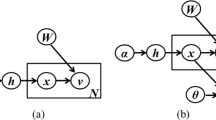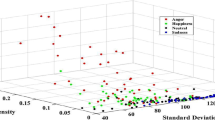Abstract
Opposing the pre-dominant turn-wise statistics of acoustic Low-Level-Descriptors followed by static classification we re-investigate dynamic modeling directly on the frame-level in speech-based emotion recognition. This seems beneficial, as it is well known that important information on temporal sub-turn-layers exists. And, most promisingly, we integrate this frame-level information within a state-of-the-art large-feature-space emotion recognition engine. In order to investigate frame-level processing we employ a typical speaker-recognition set-up tailored for the use of emotion classification. That is a GMM for classification and MFCC plus speed and acceleration coefficients as features. We thereby also consider use of multiple states, respectively an HMM. In order to fuse this information with turn-based modeling, output scores are added to a super-vector combined with static acoustic features. Thereby a variety of Low-Level-Descriptors and functionals to cover prosodic, speech quality, and articulatory aspects are considered. Starting from 1.4k features we select optimal configurations including and excluding GMM information. The final decision task is realized by use of SVM. Extensive test-runs are carried out on two popular public databases, namely EMO-DB and SUSAS, to investigate acted and spontaneous data. As we face the current challenge of speaker-independent analysis we also discuss benefits arising from speaker normalization. The results obtained clearly emphasize the superior power of integrated diverse time-levels.
Access this chapter
Tax calculation will be finalised at checkout
Purchases are for personal use only
Preview
Unable to display preview. Download preview PDF.
Similar content being viewed by others
References
Polzin, T.S., Waibel, A.: Detecting emotions in speech, Cooperative Multimodal Communication. In: 2nd Int. Conf. 1998, CMC (1998)
Schuller, B., Rigoll, G., Lang, M.: Hidden Markov Model-Based Speech Emotion Recognition. In: Proc. ICASSP 2003, IEEE, Hong Kong, China, vol. II, pp. 1–4 (2003)
Lee, Z., Zhao, Y.: Recognition emotions in speech using short-term and long-term features. In: Proc. ICSLP, pp. 2255–2558 (1998)
Jiang, D.N., Cai, L.-H.: Speech emotion classification with the combination of statistic features and temporal features. In: Proc. ICME 2004, IEEE, Taipei, Taiwan, pp. 1967–1971 (2004)
Murray, L.R., Arnot, I.L.: Toward the simulation of emotion in synthetic speech: A review of the literature of humans vocal emotion. JASA 93(2), 1097–1108 (1993)
Schuller, B., Rigoll, G.: Timing Levels in Segment-Based Speech Emotion Recognition. In: Proc. INTERSPEECH 2006, ICSLP, ISCA, Pittsburgh, PA, pp. 1818–1821 (2006)
Klasmeyer, G., Johnstone, T., Bänziger, T., Sappok, C., Scherer, K.R.: Emotional Voice Variability in Speaker Verification. In: Proc. ITRW on Speech and Emotion, ISCA, Newcastle, UK (2000)
Shahin, I.: Enhancing speaker identification performance under the shouted talking condition using the second order circular Hidden Markov Models. Speech Communication 48(8), 1047–1055 (2006)
Reynolds, D.: Speaker identification and verification using Gaussian mixture speaker models. Speech Communication 17, 91–108 (1995)
Young, S., Evermann, G., Kershaw, D., Moore, G., Odell, J., Ollason, D., Povey, D., Valtchev, V., Woodland, P.: The HTK-Book 3. Cambridge University, Cambridge, England (2002)
Schuller, B., Seppi, D., Batliner, A., Maier, A., Steidl, S.: Towards More Reality in the Recognition of Emotional Speech. In: Proc. ICASSP 2007, Honolulu, Hawaii (2007)
Witten, I.H., Frank, E.: Data Mining: Practical machine learning tools with Java implementations, p. 133. Morgan Kaufmann, San Francisco (2000)
Burkhardt, F., Paeschke, A., Rolfes, M., Sendlmeier, W., Weiss, B.: A Database of German Emotional Speech. In: Proc. INTERSPEECH 2005, ISCA, Lisbon, Portugal, pp. 1517–1520 (2005)
Hansen, J.H.L., Bou-Ghazale, S.: Getting Started with SUSAS: A Speech Under Simulated and Actual Stress Database. In: Proc. EUROSPEECH 1997, Rhodes, Greece, vol. 4, pp. 1743–1746 (1997)
Author information
Authors and Affiliations
Editor information
Rights and permissions
Copyright information
© 2007 Springer-Verlag Berlin Heidelberg
About this paper
Cite this paper
Vlasenko, B., Schuller, B., Wendemuth, A., Rigoll, G. (2007). Frame vs. Turn-Level: Emotion Recognition from Speech Considering Static and Dynamic Processing. In: Paiva, A.C.R., Prada, R., Picard, R.W. (eds) Affective Computing and Intelligent Interaction. ACII 2007. Lecture Notes in Computer Science, vol 4738. Springer, Berlin, Heidelberg. https://doi.org/10.1007/978-3-540-74889-2_13
Download citation
DOI: https://doi.org/10.1007/978-3-540-74889-2_13
Publisher Name: Springer, Berlin, Heidelberg
Print ISBN: 978-3-540-74888-5
Online ISBN: 978-3-540-74889-2
eBook Packages: Computer ScienceComputer Science (R0)




